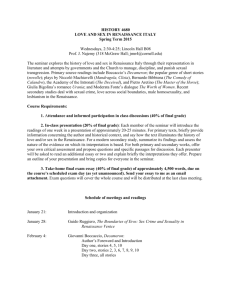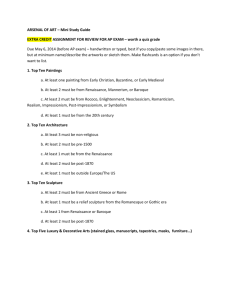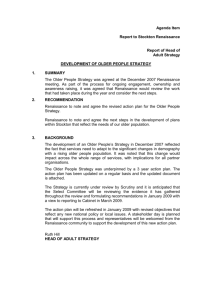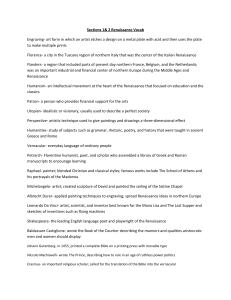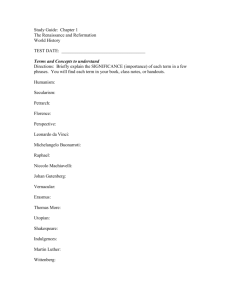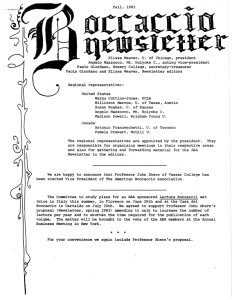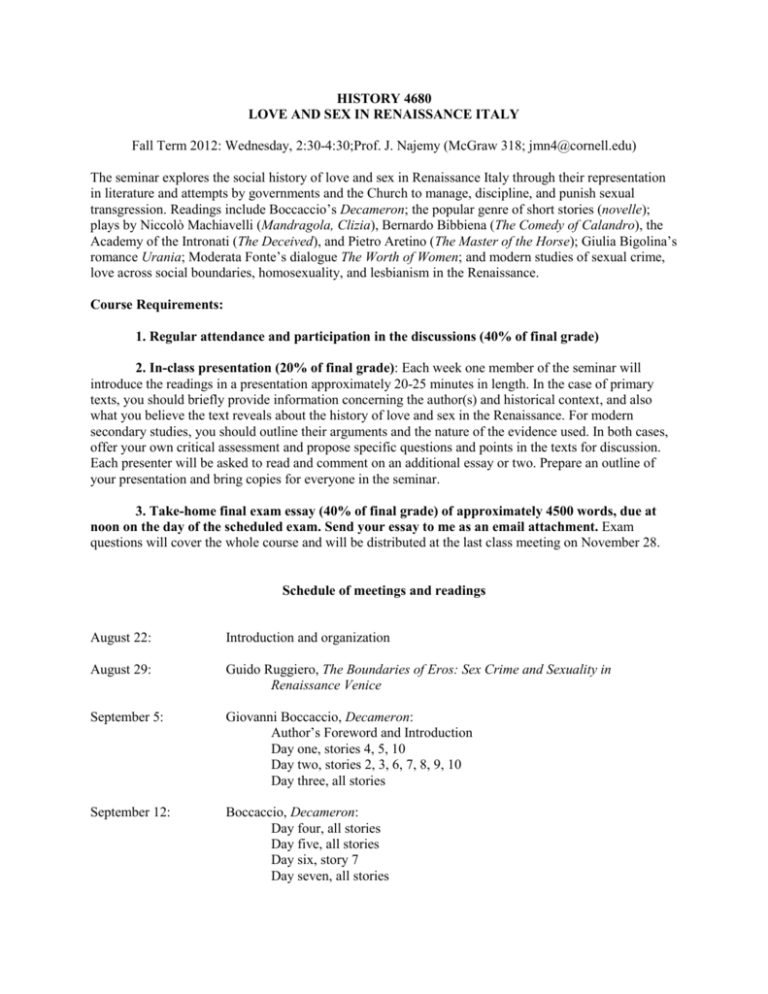
HISTORY 4680
LOVE AND SEX IN RENAISSANCE ITALY
Fall Term 2012: Wednesday, 2:30-4:30;Prof. J. Najemy (McGraw 318; jmn4@cornell.edu)
The seminar explores the social history of love and sex in Renaissance Italy through their representation
in literature and attempts by governments and the Church to manage, discipline, and punish sexual
transgression. Readings include Boccaccio’s Decameron; the popular genre of short stories (novelle);
plays by Niccolò Machiavelli (Mandragola, Clizia), Bernardo Bibbiena (The Comedy of Calandro), the
Academy of the Intronati (The Deceived), and Pietro Aretino (The Master of the Horse); Giulia Bigolina’s
romance Urania; Moderata Fonte’s dialogue The Worth of Women; and modern studies of sexual crime,
love across social boundaries, homosexuality, and lesbianism in the Renaissance.
Course Requirements:
1. Regular attendance and participation in the discussions (40% of final grade)
2. In-class presentation (20% of final grade): Each week one member of the seminar will
introduce the readings in a presentation approximately 20-25 minutes in length. In the case of primary
texts, you should briefly provide information concerning the author(s) and historical context, and also
what you believe the text reveals about the history of love and sex in the Renaissance. For modern
secondary studies, you should outline their arguments and the nature of the evidence used. In both cases,
offer your own critical assessment and propose specific questions and points in the texts for discussion.
Each presenter will be asked to read and comment on an additional essay or two. Prepare an outline of
your presentation and bring copies for everyone in the seminar.
3. Take-home final exam essay (40% of final grade) of approximately 4500 words, due at
noon on the day of the scheduled exam. Send your essay to me as an email attachment. Exam
questions will cover the whole course and will be distributed at the last class meeting on November 28.
Schedule of meetings and readings
August 22:
Introduction and organization
August 29:
Guido Ruggiero, The Boundaries of Eros: Sex Crime and Sexuality in
Renaissance Venice
September 5:
Giovanni Boccaccio, Decameron:
Author’s Foreword and Introduction
Day one, stories 4, 5, 10
Day two, stories 2, 3, 6, 7, 8, 9, 10
Day three, all stories
September 12:
Boccaccio, Decameron:
Day four, all stories
Day five, all stories
Day six, story 7
Day seven, all stories
2
September 19:
Boccaccio, Decameron:
Day eight, stories 1, 2, 3, 4, 7, 8, 10
Day nine, stories 1, 2, 5, 6, 7, 9, 10
Day ten, stories 4, 5, 6, 7, 8, 9, 10
Author’s Afterword
September 26:
Gene Brucker, Giovanni and Lusanna: Love and Marriage in Renaissance
Florence
October 3:
In Renaissance Comic Tales of Love, Treachery, and Revenge:
Gentile Sermini, “Montanina’s Deception,” and “Sir Giovanni da Prato
and Baldina,” 1-41
Lorenzo de’ Medici, “Giacoppo,” 64-76
Masuccio Salernitano, “Jealous Ioan Tornese,” “How Viola Tried to
Satisfy Her Three Lovers on the Same Night,” and “Two Dear
Friends,” 128-138, 152-165
In Five Comedies from the Italian Renaissance:
Anonymous, The Venetian Comedy (La veniexiana), 285-321
October 10:
Niccolò Machiavelli, Mandragola, in Five Comedies, 71-116
Niccolò Machiavelli, Clizia
October 17:
Bernardo Dovizi da Bibbiena, The Comedy of Calandro, in Five Comedies, 1-70
Academy of the Intronati of Siena, The Deceived, in Five Comedies, 205-284
Matteo Bandello, “The Twins Nicuola and Paolo,” in Renaissance Comic Tales,
77-114
October 24:
Michael Rocke, Forbidden Friendships: Homosexuality and Male Culture in
Renaissance Florence, 3-147, 195-235
October 31:
Pietro Aretino, The Master of the Horse, in Five Comedies, 117-204
Rocke, Forbidden Friendships, 148-191
November 7:
Giulia Bigolina, Urania: A Romance, 17-69, 73-174
November 14:
Judith Brown, Immodest Acts: The Life of a Lesbian Nun in Renaissance Italy
November 28:
Moderata Fonte, The Worth of Women, 27-241, 249-260

